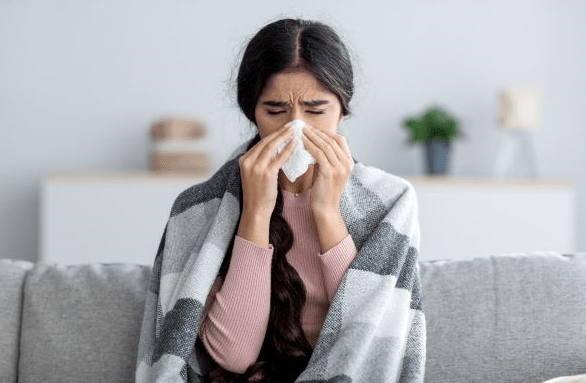Air conditioning, or AC, is a common appliance in many homes and offices around the world. It helps to regulate indoor temperatures during warmer months, making the environment comfortable and cool. During the hottest times of the year, it can be a necessity for a large part of the world’s population. However, there is a popular belief that ACs can make you sick. This belief is based on the observation that people tend to get sick more often during hot weather, when air conditioning units are in use. But can AC really make you sick?
The short answer is no. For a slightly longer answer: the AC itself will not cause sickness, but environmental factors created by an air conditioner could lead to issues that could increase your chances of sickness if not properly used. In this article, we will discuss the factors that could make you sick when using an AC and how to prevent these issues.
Poor AC Upkeep
Firstly, it is essential to understand that air conditioning units do not generate or circulate viruses, bacteria, or other microorganisms that can cause illness. The AC works by circulating air from the indoor space and then cooling it down before circulating it back into the room. If properly maintained, the filters in the air conditioner remove dust, allergens, and other airborne particles from the air.
However, if the AC is not well maintained, the filters can become clogged and fail to remove these particles from the air. Dirty filters can also harbor mold and bacteria, which when circulated throughout your space can cause respiratory issues and allergies.
Moreover, ACs can create an environment that promotes the growth of bacteria and viruses. When the temperature drops below a certain point, the air conditioning unit’s cooling coils can become damp, which can create a perfect breeding ground for bacteria and mold.
The presence of moisture, coupled with the cool temperature, can also cause condensation, leading to water droplets forming on the AC’s vents. These water droplets can mix with dust and other airborne particles, creating an ideal environment for bacteria, viruses, mold, and other fungi to thrive. Some people can be more sensitive to this exposure, including those who have asthma or other allergies, children, seniors, and people with compromised immune systems.
Sick Building Syndrome
One of the most common issues associated with ACs is sick building syndrome (SBS). This is caused by the buildup of indoor air pollutants, including dust, mold, and volatile organic compounds (VOCs). These pollutants can accumulate in poorly ventilated spaces and cause respiratory issues, headaches, dizziness, and other symptoms, including more serious forms of dehydration, increased blood pressure, and exhaustion.
SBS isn’t actually a disease. Rather, the symptoms are linked to airborne contaminants that only cause illness when you are in the building in question. When you leave the building, the symptoms improve or even disappear. While these pollutants are not caused by air conditioning, ACs can contribute to the sick building syndrome by recirculating indoor air, which can contain these pollutants.
How To Keep Your Air Clean
To prevent these issues, it is essential to maintain your air conditioner and HVAC system properly. Here are some tips to keep your AC clean and prevent environmental factors that could lead to illness:
- Change the filters regularly: The filters in your air conditioning unit need to be changed regularly, with no less frequency than once every three months, and more often during heavy use. As we mentioned earlier, dirty filters can harbor mold and bacteria, which can cause respiratory issues and allergies.
- Clean the AC coils: The air conditioner’s coils should be cleaned at least once a year to remove any dirt or debris that may have accumulated, and more frequently if they are visibly dirty. Dirty coils can cause condensation, leading to the potential growth of mold and bacteria.
- Use a dehumidifier: This will of course depend on the natural humidity levels of your home environment. If you spot mold, a dehumidifier can help to reduce the humidity levels in your home or office, preventing the moist environment needed for the growth of mold or other serious bacteria.
- Ensure proper ventilation: Proper ventilation is essential to prevent the buildup of indoor air pollutants. Open windows and doors to allow fresh air into your space, especially when the AC is not in use.
- Maintain a clean environment: Keep your home or office clean, dust-free, and free of clutter. This will reduce the amount of dust and other airborne particles that can accumulate in the air conditioning unit’s filters and coils.
Regular HVAC maintenance is crucial to avoiding illness related to your AC unit. Professional checkups will catch any leakages or early signs of mold development so they can be managed before they become a problem. This will not only keep the air you breathe healthier, but it’ll help your air conditioner run more efficiently, saving you money.
Final Word
So, can AC make you sick? Air conditioning does not cause sickness directly, but environmental factors created by an air conditioner can lead to respiratory issues and allergies. While not life-threatening, these symptoms can be increasingly frustrating, especially if you spend a lot of time in the space. It can also affect your routine and decrease productivity.
The best way to avoid potential issues is to properly maintain your AC. A well-kept unit will help keep your indoor environment free of contaminants and irritants that could affect your health. Once or twice a year, enlist the help of a professional HVAC company, such as Entek in Portland, OR, for cleaning, an inspection, and minor repairs to keep your unit in tip-top shape. That way, you can enjoy the benefits of your AC without worrying about getting sick.

